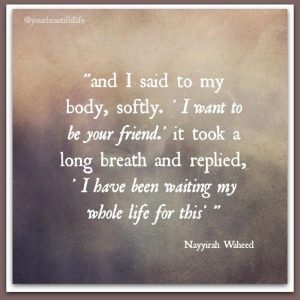Sometimes life is a prayer, a quiet one that you whisper on exasperated breath. And sometimes days are but a breath, and weeks a string of breaths or prayers or breathing prayers or praying breaths that escape your lips before you even have the chance to sigh or sing or sit in silence.
These six weeks have taught me to breathe in ways I had never imagined possible before.
Inhale. But do not take the entire world in. Only the places and people and things that most excite you.
Work fervently. Ask questions. Ask questions about your questions. Read and ponder and imagine and create and believe.
Exhale.
More than the black feminist theory, the literary criticism, the technical knowledge about Digital Humanities skills, I am most grateful for the process. The space in between the inhale and exhale where we wrestled with our ideas in productive tension until they were proven durable. Never before have I had to think so critically about my academic and technical choices, nor had I ever had to think about anyone but a professor reading my work, let alone the prospects of an audience. I enjoyed being given the task of more than blank pages on which to breathe life – a platform to create, opportunities to face my fear of public speaking head-on, a community with which to engage and get excited about my and their ideas. These are the things I cherish most about this process, the dynamism of research and academia I have encountered through these experiences.
Don’t get me wrong – I am excited about project and will continue to develop my ideas as I develop my ethnographic sensibilities. This work has encouraged me to continue to focus on the richness of the Caribbean experience, quite often overlooked by academics from the Global North. This work has also reminded me of the urgency of anthropological research – that it should always be seeking to make strange the familiar and the familiar strange so as to move towards a more empathetic and altogether more just world. Afro-Jamaican working class women are positioned at the base of Jamaica’s race-class hierarchy, are often the victims of interlocking systems of structural oppression and are often blamed for causing the conditions they encounter. As long as I can research, my work will always be positioned towards unpacking the social relations that intersect to produce marginalization in Caribbean societies, especially Jamaica.
But the process is what I will carry with me as I embark on the rest of this journey.
There is another way that this program has taught me to breathe. It is the kind of gentle breath that asked me to be kind to myself, mind and body. I’ve suffered from anxiety my entire life. Lack of stability, security and the tentacles of poverty have done much violence to my personhood, but in an attempt to be productive, I had to face the ways I was not loving myself, even when I was given the chance to. The night we sat around candlelight, having dinner, sharing ourselves with each other as a community, I learnt to breathe, to not police myself, but be vulnerable and live in the moment. Today, I try my best to remember that. And even while I was in and out of medical centres, body screaming in between blood tests and ECGs, I realized that the only thing my body really needed was rest, and care, and prayers and breaths and breaths and prayers. I have not fully overcome anxiety, but I am on a path I’ve never trod before, one that leads to health of mind and body and soul. I’m not crying, I promise.
I am grateful to this program in more ways than one.
I will end with one of my favourite poems from Nayyirah Waheed which best characterizes the turn my life has taken:

All the best for the summer, everyone. Let’s keep in touch every now and then.